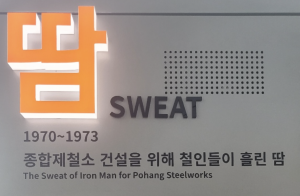Pohang: POSCO Museum
Photo essay of wall text of POSCO Museum of Pohang

Photo essay of wall text of POSCO Museum of Pohang

XXX

I'm interested in better understanding the ongoing geological processes that shape St. Louis and the Mississippi Valley region. So far, I've been looking into the history of seismicity in the region, focusing on the fascinating but little known history of the New Madrid earthquakes of 1811 and 1812 -- the most devastating earthquakes to have hit the US east of the Rockies. I've also been exploring how St. Louis and surrounding areas are dealing with the possibility of another earthquake occurring in the future. According to one article I read, one of the biggest uncertainties is what would happen to the heavily engineered Mississippi River in the case of another major tremblor. The shaking could break the levees, flooding wide areas along the river and creating cascading effects. The flow of the river might also reverse completely, as occurred during the New Madrid earthquakes.
On these possibilities and the lack of scientific consensus surrounding intraplate seismicity in this zone, see this article in The Atlantic.
On current efforts to create earthquake hazard maps in St. Louis, see this overview on the US Geological Survey site.
For a deeper dive into the history of the New Madrid earthquakes, see this book by historian of science Conevery Bolton Valencius.
The citations found in this article's bibliography tell us that the information presented was drawn from various research articles about past responses to large disease outbreaks, and public health policies regarding topics such as food safety and bioweapons. This article is an interpertation of existing information, and does not seem to provide any new research.
I researched
1. Early fire response systems mentioned in the article, such as fireproof blankets, early fire extinguishers, and fireproof building construction
2. Underwriters Labs and other safety research labratories
3. The final reports on the cause of the WTC collapse
Didier Fassin is a French anthropologist and a sociologist in the school of science at the Institute for Advanced Study in Princeton, NJ. He has conducted fieldwork in Senegal, Ecuador, South Africa, and France. Fassan is also trained as a physician in internal medicine and holds a degree in public health. Some of his early research focused on medical anthropology, the AIDS epidemic, mortality disparities, and global health.
I looked up disaster capitalism, how emergency response mutual aid to the katrina disaster was handled, and how reconstruction has progressed in more recient years.
The bibliography of this article shows that most of the data drawn for this paper was from other scholarly papers, which leads me to believe that no new research or studies were done to gain information for this article.
The viewpoints of elected goverment officials on the state and federal levels are lacking from this film.